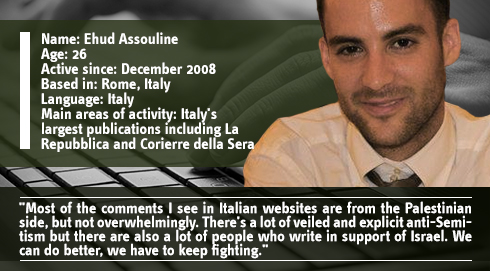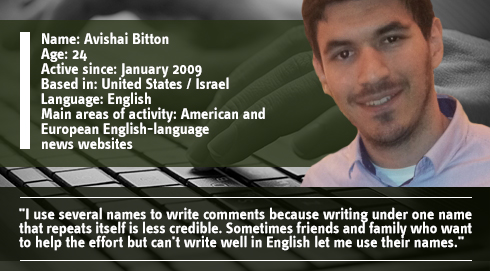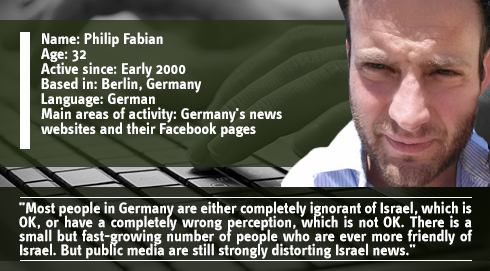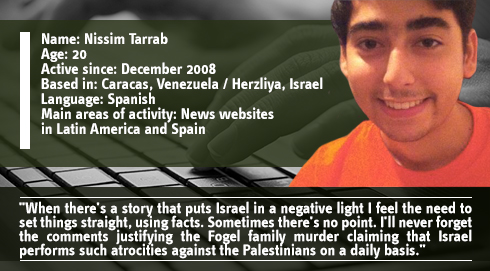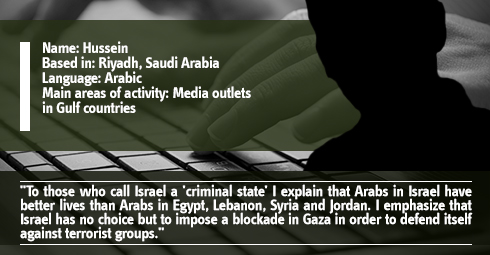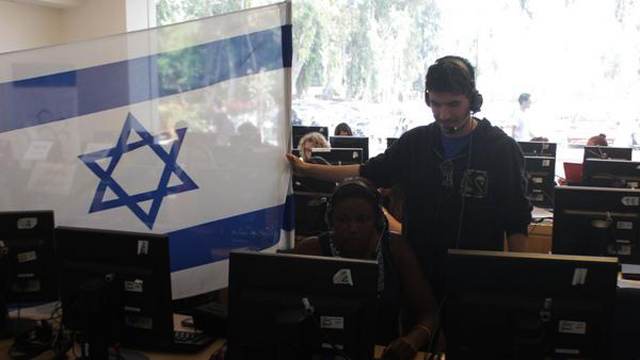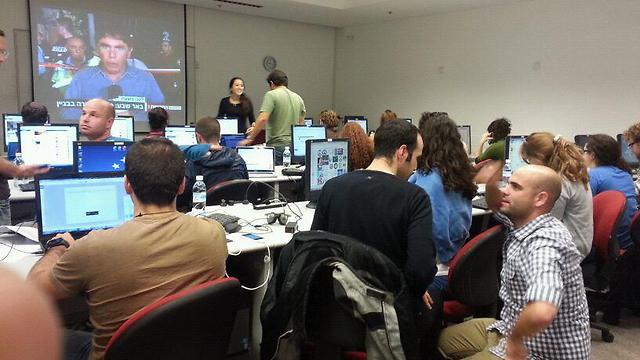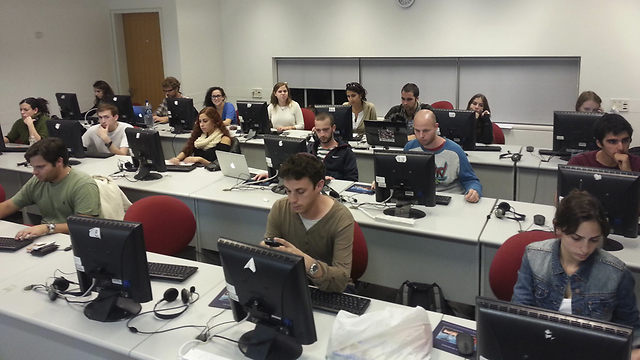Comment posted, damage done
Online battle for Israel’s hasbara
By Eyal Lehmann
Israeli news site YnetNews, September 19, 2013
Internet pages are fighting ring where Israel supporters try to ward off millions of pro-Palestinian posters. In hectic, viral world of talkbacks, every photo is replied, every reply is commented on, every comment has minute-long shelf life before it is challenged by rivals
On July 11, the Middle East made headlines in Italy again. Not one missile fell in Israeli territory, nor was a terrorist killed in Gaza. Still, for 24 hours, one feature did not escape the headlines on the La Repubblica website, one of the two most popular news sources in the country: “Israeli soldiers,” the website reported with a video, “arrested a five-year-old Palestinian boy in the West Bank for throwing rocks.” The IDF maintained that the boy was merely detained and then released back to his parents, but many Italian surfers saw enough to unholster.
“They should be annihilated,” surfer Fabrizio posted on the La Repubblica Facebook page, which attracts over 1.2 million readers. “Hitler should come back and destroy you, dirty fascists,” surfer Salvino added. Surfer Fabio posted “Israelis are doing to the Palestinians what the Germans did to them,” while surfer Terry posted a response reading “these are the Nazis of the third millennium, but because they have money and American friends, the Palestinians are the ones seen as terrorists.” A particularly active poster named Viviana wrote: “Israel is a murderous country! It’s committing an unprecedented ethnic cleansing! Poor Palestinians.”
Some 600 comments pile on the website; bold, poisonous, at times succinct and often not. Suddenly, someone raises a challenge. “What are you talking about?” Ehud wards off Viviana in fluent Italian. “Ethnic cleansing? Daily injury of women and children? Do you have proof or are you just firing slander? Remember reality is not black and white, and that one must always study things before taking such a stark stand.” A Palestinian named Mussa replies: “Ehud, why doesn’t Israel restore the ’67 lines instead of building in settlements, considering Palestinians have acknowledged its existence? Under what right did Israel take away my country?”
“Mussa,” Ehud replies politely, “before we can talk about borders, one real development must occur—the realization of both nations that the country will have to be shared. I’m afraid that realization has not yet taken place. Hamas crying out against Israel’s existence and Israel building new settlements both testify to that.”
Ehud Assoulin is a 26-year-old from Ramat Hasharon who has been living and studying in Rome for the past four years. “I started posting comments in Italian for Israel during Operation Cast Lead,” he said, “when Italian media was turbulent, and I saw an array of media distortions and prejudice about Israel. It made me angry on the simplest and most moral level and I felt that I couldn’t stay indifferent.”
Since then, unusual news regarding Israel set him at the computer screen: “My goal is to make Italians think and go past the ordinary and simplistic patters they are mostly captive in, to make them realize that in reality things are much more complex.”
Assoulin is one of many Israelis, Jews and Zionists abroad who take part in the most informal and quiet hasbara war in recent years: The war of comment posters.Dubbed “Talkbacks” in Hebrew, comments first appeared in the bottom of news websites, where they were carefully screened for swear words and racism, but recently they’ve wandered to the news Facbook pages, which attracts hundreds of thousands if not millions of followers. There, under a full name and without masks, anything goes.
Now, in the Israeli-Palestinian battle for world opinion, comments are an unusual battlefield: They are the only arena in virtual space that creates a direct, real-time and active conflict between Israel’s supporters and its opponents. Here, cleaver illustrations of missiles or a screen caption of a mother shielding her children from missiles will not do; in the neurotic world of talkbacks, every photo has a reply, every reply has a comment, and every comment has a minute-long shelf life before it too is debunked by rivals. Which truth will eventually win – the Israeli one or the Palestinian one? Much of it depends on comment posters’ perseverance and their devotion to the battle of the minds.
4% write, 30% read
Dr. Tzvi Reich from the Department of Communication in Ben-Gurion University took part in a thorough international study where Internet surfing and comment posting habits were studied on 24 leading news websites in the world, from the US to France, from Germany to Estonia. He said the comment posters’ ability to control discourse compared to their size in the population is simply enormous. Studies in the world and in Israel, he said, show that only 4%-7% of news website surfers post comments, and a much larger percent reads them: 30%-40% of surfers.
“A small group of comment posters who are skilled and devoted can monopolize an article, such as a political item in Israel, and appear as a majority, or at least larger than it is,” he said. It is clear to him that comments posted on news websites have psychological effects as well: “A surfer can read a comment on an article and understand they’re in the minority and feel bad about it, like they’re on the wrong side.”
That is the exact reason why some try to show surfers “the right side”. Avishai Bitton, a 24-year-old student from Rishon Lezion, is another Israeli web warrior. As a child, he came to Israel from New York, where he lived right across from the UN Headquarters. During his military service, a while after the operation in Gaza in 2009, he went to visit family in the US and passed by a pro-Palestinian rally in the Big Apple. The chasm between the signs reading “Israel is a murderer” and his experiences as a soldier in the most moral army in the world, as he continuously calls it, jolted him. Since then, he has been there: Morning, noon, night, whenever is needed. Coffee on the table, laptop in his hands, looking for virtual battles around the world.
“There isn’t a day when I don’t visit an international news website,” he says. “Some days the world is merciful and focuses on Syria and I can sleep. But you find yourself awake at night, and it’s not just due to empathizing with the State, it’s because of wanting justice. You write ten lines in a comment just so you can go to bed at night and say, ‘I did what I could, I showed the other side of the story as much as possible.’ There were days when I spent 12-14 hours in front of news site. I got up in the morning, I sat at the computer; and only went to sleep when I could no longer write.”
Comment posters, he knows well, are cruel. Next to legitimate criticism about Israel, in the bottom of the world’s news websites, he and his peers have seen the most blatant of lies. When surfers see a Palestinian’s body, they start chanting lies: That the Israelis drink Arabs’ blood and rape women at checkpoints.They share experiences from their latest visit to the Gaza Strip and talk about Israeli soldiers who torture children for fun while drinking and laughing. It is unclear how many of them know that other than in special operations, there have been no Israeli soldiers in Gaza for eight years. It does not matter: Comment posted, damage done. Bitton tries to beat them with words and images: Strives to expose hasbara lies by the other side, prove commenters’ ignorance, and raise questions that could dent their absolute faith.
“When you’re fluent in a language and know local customs, it gives you another perspective,” he said. “Surfers think, here is a person who is from my country and is out there and telling us what he’s experienced. Knowing Americans, for example, I don’t comment on a news item the same on the Republican Fox News website as I do on the liberal CNN website. I can appeal to emotion on Fox News since its surfers are predisposed to support Israel, CNN’s liberal readers need more logic and data. They want to know how and why; you have to show them less familiar angles.”
‘Like teaching cows to read’
The comment war suggests that maybe we do not suffer from a persecution complex; that maybe Israel is covered not proportionally to its size. Dr. Reich said that editors of news websites around the globe who took part in his study all said one issue makes their comment system spin more than any other: “Editors all over the world, from the Washington Post, from the Guardian, from Die Welt, from La Figaro, all talk about an influx of comments on any item related to the Israeli-Palestinian conflict.
“In the comments for any item, the discourse deteriorates to hate speech. Website editors described the experiences saying,’you posted an item about the Mideast? You won’t get any sleep.’ They map out organized pro-Palestinian and Palestinian communities on one side, and pro-Jewish or Jewish communities on the other, that fight between them and ravage any new item published.”
But Israelis and Jewish communities in the Diaspora are not alone in the fight. “The majority of the people writing pro-Israel talkbacks are not Jewish,” said Philip Fabian, a 32-year-old German from Berlin. “I never started to write pro-Israeli talkbacks consciously. I am a classic news-junkie, and the internet contributed a lot in developing my political conscience, starting in the post 9/11 world and the Intifada of the last decade. It made me realize the obvious shortcomings of mainstream media news outlets, especially when it comes to Israel.”
The experience he describes sounds thoroughly Israeli: “With many people, after discussing and repeating the same things again and again, you realize that you are in a loop with no way out, and you know that trying to explain Israel or anti-Semitism to them is like trying to teach a cow how to read. But sometimes, you realize some people start to change bit by bit, because they admit to themselves that you are right in some points, or because they get a point of view on things that they haven’t encountered before.”
His comment activism came at a cost: “At times, the urge to argue about Israel was very strong, and it became an extremely time-consuming activity,” he said. “I wouldn’t let go of an online argument, even late at night or even during work time, and I lost a few friends who thought I was obsessed, but I don’t regret it. Advocating for Israel introduced me to new friends.”
The most skilled comment posters know to characterize other comment posters according to their land, and describe Latin America as one of the most problematic zones for Israel: “There’s a horrible knowledge base there,” a senior comment poster said, “Sometimes people write about Israel like they used to talk about the world being flat, showing false data and ‘facts’ that make us cry and laugh simultaneously.”Trying to set the record straight is Nissim Tarrab, a 20-year-old from Venezuela who is studying for his bachelor in communication in Israel. Every day he logs on to the biggest Spanish news sites: From papers of his own country, to the Argentinean Clarin and the Spanish El Pais.
“There have been a lot of changes in Latin America recently, and common financial interests with Arab countries cause South American countries to side with the Palestinians,” he said. “From there it sometimes looks like Israel is a dictatorship where Arabs have no rights. I read the news in Spanish every day, and when I find a story that sheds a negative and unjustified light on Israel, I’m moved to clarify the situation based on facts.
“It’s often frustrating, and some comment posters are not worth the debate. We got used to anti-Semitic remarks glorifying Hitler and denying the holocaust, but I’ll never forget seeing comment posters who justified the Fogel family massacre, who said that Palestinians experience that everyday. I was shocked, I couldn’t understand it.”
A lost cause in the comment war is the Arab arena, but even there, it turns out, there are those who maintain the wellbeing of Zionism. A few Arab Israelis who were part of hasbara efforts during various wars refused to be interviewed, but young Saudi Hussein, resident of Riyadh, is proud of his work. He started posting comments supporting Israel four years ago.“I admit that I used to hate Israel because of the propaganda in the Arab and Muslim world,” he said, “And I even thought any dialogue with Israelis is treason. But as time passed, my opinions changed, and the Israelis I talk to helped me see the facts.” Hussein saves Israel’s face on Arab websites and on Facebook. More than once, he said, he has received hateful comments from extreme Islamists, as he calls them, who were enraged about his support of Israel’s existence and about negative comments he made regarding Hamas and Hezbollah.
“I write that I’m a good friend of Israel and Israelis and I’m proud of it,” Hussein said. His Saudi friends are aware of his odd hobby, and he said some support him and some do not care. He is not afraid of the Saudi regime, either: “I know the red lines in my country. If you attack religious symbols like Muhammad, you’re in trouble, but if you praise Israel – there’s nothing to worry about. Many Saudis support peace with Israel, and many famous Saudi individuals, like the manager of Al-Arabiya, said wonderful things about it without anything happening.”
Hussein’s work, naturally, is especially difficult: “Lies in the Arab media are many and big, and anything negative relates to Israel. The latest lie is of course by Assad supporters, who accuse Israel of aiding Jihadists in Syria. To those who call Israel a criminal I explain that Arabs in Israel live a much better life than Arabs in Egypt, Lebanon, Syria or Jordan, and that Israel is a democratic country that doesn’t discriminate. I emphasize that Israel must blockade Gaza to protect itself from terror organizations, and that food and medicine are always being sent to the Gaza Strip.”But it works the other way, as well. The Israeli army of comment posters is made up of idealists driven by a sense of calling who want to prove the world wrong, but some of them say they themselves sometimes are faced with complex reality, and enemy comments seed doubts in them. Some incidents are hard to justify, some killing is avoidable, and sometimes they too are convinced that Israelis can do more for peace.
“I’m generally very convicted of the importance of Zionist work,” said Assoulin, “So there isn’t a comment poster who made me question the idea that Israel is based on, but such massive exposure to opposite opinions has made me see the reality in a more balanced way. I also don’t rush to justify everything Israel does. When soldiers in the West Bank detained the five-year-old, I clarified in my comments that I think the soldiers were wrong, and focused on explaining the context, the fact that what happened was a detainment and a slap on the wrist, not an arrest, and that it’s not a game of good vs. bad.” Many comment posters also say that the building in the settlements is an action they find difficult to explain.
Copy-paste hatred
The most successful attempt to raise an army of comment posters was during Operation Cast Lead, when the Interdisciplinary Center (IDC) Herzliya started a round-the-clock “war room”, where 1,600 multilingual students, mostly foreign students who were studying in Israel at the time, commented on major news websites. Three teams focused on posting comments to websites in 34 languages and 61 countries, and reached, they estimate, 20 million computer screens. Other than comments in English, Spanish and Russian, they made sure to leave pro-Israeli comments on websites in Georgia, Turkey, South Korea and other arenas not considered “classic”, all in the country’s native tongue.
Avishai Bitton at IDC online comments war room
“The idea we worked by was that we are not official representatives of the country, but simple people writing about our personal feelings living under fire, and that’s how we achieved what we did,” said Yarden Ben-Yosef, who started the war room. “I remember that on a news site in Denmark, comment posters promoted an anti-Israeli protest, and our posters developed a dialogue with them and showed them, in Danish, the Hamas Charter that calls to destroy Israel and links to Hamas summer camps that teach Palestinian children hate. Remarkably, a comment poster who was so active in promoting the protest suddenly admitted he never saw those things before.”The problem is, comment posters say, that on regular, days Israel doesn’t hold an army of commenters. During a military operation, a force like that may be started ad hoc, but the comment war is a long-term war and it is daily events—from the killing of terrorists depicted as innocent citizens to releasing Palestinian murderers depicted as “political prisoners”—that keep it in motion. World opinion, therefore, continues to form in the war between the wars.
IDC comment war room (Photo: Oren Kochavi)
Firing online comments in 34 languages to 61 countries (Photo: Oren Kochavi)
Four years ago, it was said that the Foreign Ministry was starting a division of paid comment posters to increase Israeli presence online, but the idea never took off. The Foreign Ministry explained that not only questions of cost went into the process, but questions of morals and reliability. A country that pays people, regardless of their opinion, to market it to the world, guised as independent surfers, is playing a very dangerous game.“Even in the hasbara war, not all means are ‘kosher’, let alone if we consider ourselves to be the good side,” said Foreign Ministry’s Department of Digital Diplomacy Director Yoram Morad. “I’ve heard of programs that can flood pages with pro-Israeli messages, we could open fictitious profiles, but beyond the fact that such deceit is easily exposed these days—it’s just not the way.” Although comments are the only arena of direct conflict, the Foreign Ministry believes they are of less importance than viral posts on Facebook and Twitter or presence in the radio, television and printed press.
The keyboard fighters attest almost unanimously that in the visibility fight on comment pages, the Israeli defeat is absolute; according to numbers alone, we are David all over again, and the Arabs – Goliath. Israel is a melting pot with a huge potential of bilingual and multilingual comment posters, but in certain countries in the world, blue-and-white comments that question the news report itself or the comments on it, are mere isles in a sea of pro-Palestinian reproach.
Yarden Ben-Yosef said that in this war, numbers matter as much as words. “Even if the most intelligent writer writes a comment rich with data and historical facts, no one will read it because it’s too long. Ten pro-Palestinian comments that simply say “murderers” or another emotional word will win the battle for the readers hearts and on public opinion, and we should strive to balance the playing field, numbers-wise.”
Avishai Bitton disagrees with him. He calls those comments “copy-paste hatred” and in that game, if you ask him, we lost before the starting shot was even fired. A billion and a half Muslims sprinkled with anti-Israeli European sentiment leave no room for several dozens of millions of Israel-supporting Jews and Christians. “I don’t deny the fact that when the layman reader sees that about 90% of comments slander Israel they tend to adopt the position, but I think we shouldn’t focus on those readers, since it’s a lost cause. We should focus on intelligent readers who are genuinely interested in the conflict, who in 10 or 20 years will be leaders in their countries. It’s better to lose a thousand students on a campus in the US but gain the sympathy of one honors student of international relations, the one who will one day be a UN diplomat and have much more impact on our fate.”
The Foreign Ministry in Jerusalem believes that institutional focus on comments is unrealistic, and the strategy of “pressure on the whole field” (investing in relations with pro-Israeli organizations, universities and key communities abroad) is the right way to create meaningful hasbara leverage, which will vicariously move the wheels of pro-Israeli comment posts. Until then, they’re relying heavily on independent initiative.
“We won’t find four million state workers who will post comments,” said Morad, “and that’s why Israelis need to understand that in that area, things depend on them much more than on the government. We can each do something, even if it’s educating two surfers, and the ministry’s job is to make sure there are no Israelis who wish to join the effort and find they have no one to turn to for tools and information.”
Roi Kais contributed to this report
- Hasbara - The Zionist War on Truth
- On Jewish Students Hasbara Handbook
Includes revealing excerpts from this Jewish propaganda handbook - a must read!
- Hasbara spam alert - The hasbara brigade strikes again!
Article from The Guardian on Israel's Foreign Ministry organizing Jewish volunteers to flood news websites with pro-Israeli comments - the world of Propaganda 2.0.
- More on the Internet and Jewish influence, Israeli interference
|
Races? Only one Human race United We Stand, Divided We Fall |
 |
No time to waste. Act now! Tomorrow it will be too late |
|

























